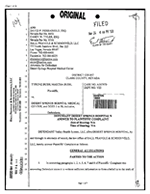Friday, July 16, 2010 | 2 a.m.
Related documents (.pdf)
Do No Harm: Hospital Care in Las Vegas
- Prologue: A breakthrough in transparency
- Reporting is the first of its kind in Nevada
- Health care can hurt you
- Accident took her life, his heart
- Fall proves fatal for elderly patient
- Inadequate care, unspeakable pain
- Scarred for life by mistake in surgery
- Where I Stand: Fascination and frustration in reporting on Las Vegas hospital care
- Editorial: Preventing harm
- Health care leaders discuss Sun report’s findings
- St. Rose Dominican Hospitals to post data on quality
- State presses hospitals for full accounting of preventable injuries
Share your stories
State officials released data on preventable injuries and infections in Nevada hospitals Thursday that mirror the findings of a Las Vegas Sun investigation.
The newspaper’s analysis of hospital billing records on file with the state has shown a wide discrepancy between the cases of patient harm detailed in those records and the number that hospitals have reported to the state as so-called sentinel events — unexpected incidents that cause injury, or the risk thereof, in a hospital.
The Nevada State Health Division analysis found hospital patients suffered 342 preventable injuries or infections during the second half of 2009, while facilities reported only 44 sentinel events. Each of the 342 cases might fit Nevada’s definition of a sentinel event.
Richard Whitley, administrator of the Health Division, is pressing the hospitals to review medical records from 2009 and see if they failed to report any sentinel events, and to report them now, if need be.
On Wednesday, Whitley sent hospitals a letter accompanied by the state analysis. “We are asking that you reconcile the differences between the (incidents of harm) that were identified at your facility and the sentinel events that your facility reported,” Whitley wrote.
Hospitals are required by law to report sentinel events to the state and affected patients and review the incidents so they are not repeated.
The Sun investigation found that in 2008 and 2009 Nevada patients suffered 1,363 cases of preventable harm in acute-care hospitals. During the same period, the hospitals reported 402 sentinel events.
The Health Division, which licenses hospitals and investigates complaints against them, followed the Sun’s lead in conducting its analysis of hospital billing records, which detail every inpatient visit. The state’s findings were essentially the same as the Sun’s, state officials said.
Hospital officials said they have always abided by the law and have no qualms about the state reviewing medical records, which is the only way to determine whether a sentinel event report should have been filed.
“This is a good opportunity to make the comparisons between the clinical (medical records) and the nonclinical data (billing records) as it may help to clear up some of the questions that have been raised,” said Kathy Silver, CEO of University Medical Center.
In an interview, Whitley said now that the Sun has shown how billing data can be used, the state will incorporate this type of analysis in its regular inspection process. Hospital-acquired conditions will be analyzed quarterly, and the results will be checked against medical records to ensure sentinel events are accurately reported, he said.
Whitley said the state’s actions are not intended to be punitive. Sentinel event reporting is important to patient safety because each incident requires an analysis to determine what circumstances led to the injury. If hospitals are not reporting sentinel events, they may not be doing the analysis needed to protect future patients, he said.
Whitley said he will give the hospitals a “reasonable” period, perhaps 30 days, to report any sentinel events the facilities failed to report during the second half of 2009.
Meanwhile, Health Division surveyors will begin pulling medical records for each hospital-acquired condition identified by the state’s billing record analysis and determine whether the incidents should have been reported as sentinel events, he said. It will take no more than 18 months to complete the statewide review, he said.
Regulators can impose sanctions against hospitals that fail to report sentinel events. The maximum fine is $100 per event, per day the incident goes unreported.
If all the incidents of hospital harm were considered sentinel events, and the maximum fines were assessed, Nevada hospitals could face combined fines totaling $10.8 million.
Each hospital’s willingness to examine its compliance with sentinel event reporting will be taken into account in determining if sanctions are necessary, Whitley said.
Enormous fines are unlikely, he said, adding he does not want a short-term financial gain to get in the way of long-term improvements that would protect patients.
It’s more important to ask “How did this happen, and what are you doing about it?” Whitley said of the apparent underreporting of sentinel events. Hospitals need to examine whether there are breakdowns in their sentinel events reporting process, he said.




Join the Discussion:
Check this out for a full explanation of our conversion to the LiveFyre commenting system and instructions on how to sign up for an account.
Full comments policy